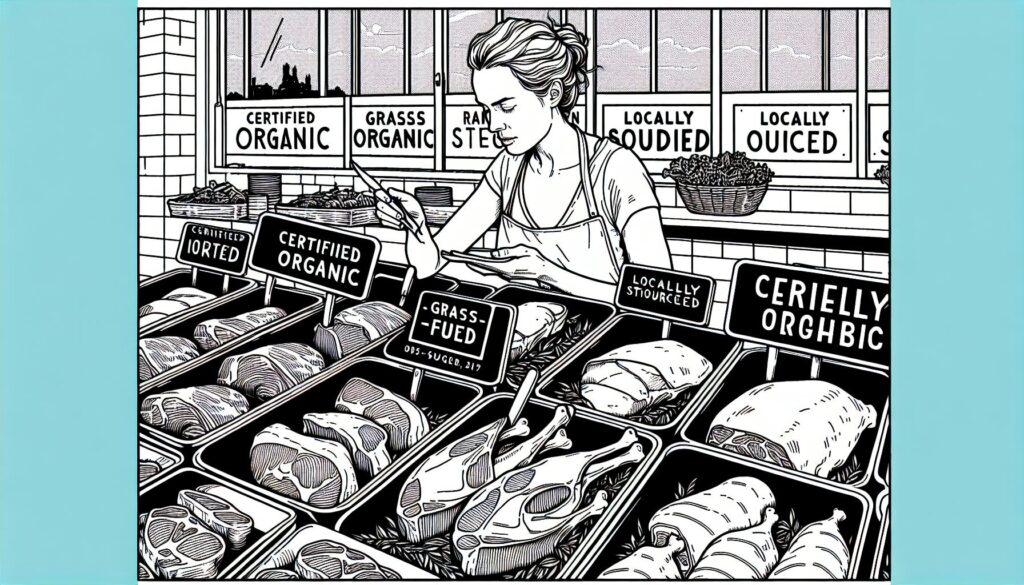As a seasoned food enthusiast, I often find myself contemplating the ethical implications of my dietary choices. Is it truly possible to consume meat ethically in today’s world? This question has sparked numerous debates among consumers, environmentalists, and animal rights activists alike.
In this article, I’ll delve into the complexities of ethical meat consumption, exploring the various factors that come into play when making conscientious food choices. From sustainable farming practices to animal welfare standards, there are many considerations to weigh when striving to make ethical decisions about the meat we eat.
Join me on this journey as we navigate the nuances of ethical meat consumption and uncover the possibilities and challenges that come with aligning our values with our dietary habits.
Exploring Ethical Meat Consumption
When Exploring Ethical Meat Consumption, it’s essential to consider various aspects that shape our food choices. Sustainable farming practices play a crucial role in reducing the environmental impact of meat production. Supporting local farmers who prioritize animal welfare and sustainable agriculture can help promote ethical practices in the industry. Consumers have the power to drive positive change by choosing products from companies that prioritize transparency and ethical standards.
Animal welfare is another significant consideration in the ethical meat consumption debate. By opting for meat from sources that follow humane treatment guidelines and higher welfare standards, individuals can support ethical practices within the industry. Certifications like Organic, Grass-fed, or Animal Welfare Approved can guide consumers in making more conscientious meat purchasing decisions.
Moreover, educating oneself about ethical labels and certifications is key to making informed choices. Understanding the impact of meat production on the environment, animal welfare, and social aspects can empower individuals to align their values with their dietary habits. Engaging in conversations about ethical meat consumption can also raise awareness and encourage others to consider the ethical implications of their food choices.
By continuously evaluating our food choices and advocating for ethical practices, we can pave the way for a more sustainable and ethical food system. Small changes in our purchasing habits can collectively lead to positive outcomes for animal welfare, the environment, and sustainable agriculture. Together, we can work towards a future where ethical meat consumption is not only possible but widespread.
Sustainable Farming Practices
When it comes to Sustainable Farming Practices, it’s crucial to consider how animals are raised and the impact it has on the environment. Opting for grazing methods that allow animals to roam freely on pasture can help reduce their stress levels and mimic natural behaviors. Supporting farmers who practice regenerative agriculture can also play a key role in promoting soil health and biodiversity.
Choosing local, small-scale farms that prioritize crop rotation and natural fertilizers can contribute to a more sustainable food system. By avoiding large-scale industrial farms that rely heavily on antibiotics and hormones, we can make a conscious choice to support ethical meat production.
Furthermore, Sustainable Farming Practices often involve reducing carbon emissions and minimizing waste. Farmers who implement composting techniques and utilize renewable energy sources help mitigate the environmental impact of meat production. By supporting these practices, we can actively participate in ethical meat consumption and contribute to a more sustainable future for our food system.
Animal Welfare Standards
When it comes to ethical meat consumption, Animal Welfare Standards play a crucial role. Ensuring that animals are treated humanely throughout their lives is essential. This includes providing adequate living space, access to natural light and fresh air, and opportunities to engage in natural behaviors.
Certifications such as Certified Humane or Animal Welfare Approved are indicators that farmers are meeting specific standards for animal welfare. Consumers can look for these labels when purchasing meat products, knowing that the animals were raised with care.
Transparency in farming practices is also key. Knowing where your meat comes from and how the animals were raised allows consumers to make informed decisions. Visiting local farms or researching the farms’ practices online can provide valuable insights into Animal Welfare Standards.
Supporting farmers who prioritize animal well-being helps promote ethical meat consumption. By choosing products from farms that adhere to high standards of care, consumers can play a part in encouraging the sustainable and humane treatment of animals raised for food.
Challenges in Ethical Meat Consumption
Navigating the realm of ethical meat consumption comes with its share of challenges. One key hurdle is the lack of universally agreed-upon standards, making it difficult for consumers to discern truly ethical practices in meat production.
Another challenge lies in the complex supply chain of the meat industry. From farm to table, it’s often challenging to trace the origin of meat products, raising concerns about transparency and the treatment of animals along the way.
Inconsistent enforcement of animal welfare laws further complicates the landscape of ethical meat consumption. While regulations exist, varying levels of oversight and enforcement can lead to disparities in how animals are treated across different farms and regions.
Consumers seeking ethical meat also face the dilemma of balancing cost and values. It’s no secret that ethically produced meat can come with a heftier price tag, posing a financial challenge for those committed to supporting humane farming practices.
Moreover, the demand for meat continues to rise globally, placing pressure on producers to prioritize quantity over quality and animal welfare. This trend can sometimes lead to compromises in ethical standards to meet the growing market needs.
As I navigate the complexities of ethical meat consumption, staying informed, asking questions, and supporting farmers who prioritize animal welfare remain essential strategies in striving for a more ethical approach to meat consumption.
Striving for Ethical Dietary Habits
When striving for ethical dietary habits, it’s crucial to be mindful of where your meat comes from. As consumers, we have the power to drive change in the meat industry by supporting ethical practices.
Opting for meat that is certified organic or from local farms can ensure better transparency in the production processes. By choosing products with labels such as “grass-fed” or “pasture-raised,” we can prioritize animal welfare and sustainable farming practices.
Engaging with local farmers at markets or through community-supported agriculture programs can also help in establishing a direct connection with the source of your meat. This direct relationship allows you to ask questions about farming practices and animal welfare standards.
In my journey towards more ethical meat consumption, I’ve found that educating myself about different certifications and labels has been empowering. It’s important to stay informed about the ethical issues surrounding the meat industry to make conscious choices that align with my values.
Key Takeaways
- Consider Sustainable Farming Practices: Support local farmers who prioritize sustainable agriculture and animal welfare for more ethical meat consumption.
- Prioritize Animal Welfare Standards: Opt for meat from sources that follow humane treatment guidelines and look for certifications like Organic, Grass-fed, or Animal Welfare Approved.
- Educate Yourself on Ethical Labels: Understanding the impact of meat production and engaging in conversations can empower you to make informed ethical choices.
- Advocate for Change: Continuously evaluate your food choices and advocate for ethical practices to contribute to a more sustainable and ethical food system.
- Understand the Challenges: Lack of universally agreed-upon standards, complex supply chains, cost-value dilemma, and rising global demand are challenges to navigate in ethical meat consumption.
- Strive for Transparency and Support: Be mindful of where your meat comes from, support farmers who prioritize animal welfare, and engage with local sources to establish a direct connection.
Conclusion
Choosing ethical meat consumption involves making informed decisions about the sources of meat we purchase. Opting for certified organic or locally sourced meat provides transparency in production processes. Labels like “grass-fed” and “pasture-raised” prioritize animal welfare and sustainability. Engaging with local farmers fosters direct communication on farming practices and animal welfare standards. Educating ourselves about certifications and labels empowers us to align our dietary choices with ethical values. By supporting ethical practices in meat consumption, we contribute to a more sustainable and humane food system.



